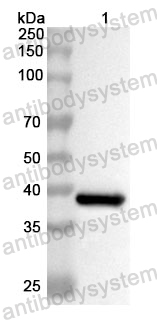Catalog No.
PHD15202
Species reactivity
Human,Mouse,Rat
Host species
Rabbit
Isotype
IgG
Clonality
Polyclonal
Immunogen
E. coli - derived recombinant Human ACAN (Ser28-Gly351).
Tested applications
ELISA: 1:4000-1:8000, IHC: 1:50-1:100, WB: 1:1000-1:4000
Target
Aggrecan core protein, Cartilage-specific proteoglycan core protein, ACAN
Purification
Purified by antigen affinity column.
Accession
Q6PID9
Applications
ELISA, IHC, WB
Form
Liquid
Storage buffer
0.01M PBS, pH 7.4, 50% Glycerol, 0.05% Proclin 300.
Stability and Storage
Use a manual defrost freezer and avoid repeated freeze thaw cycles. Store at 2 to 8°C for frequent use. Store at -20 to -80°C for twelve months from the date of receipt.
Molecular signatures of Haemonchus contortus infection in sheep: A comparative serum proteomic study on susceptible and resistant sheep breeds., PMID:39116550
Syndecan-4 inhibition attenuates cartilage degeneration in temporomandibular joint osteoarthritis., PMID:39101668
Posterior vitreous attachment as a risk factor for endophthalmitis following intravitreal antivascular endothelial growth factor injection., PMID:38748185
Interleukin-6 neutralization and regulatory T cells are additive in chondroprotection from IL-1β-induced inflammation., PMID:36205183
[Prevalence and characteristics of serum autoantibodies in patients followed for infertility at Grenoble University Hospital]., PMID:31727487
Anti-inflammatory role of TPCA-1 encapsulated nanosomes in porcine chondrocytes against TNF-α stimulation., PMID:30600473
Hyaluronic acid promotes proliferation and migration of human meniscus cells via a CD44-dependent mechanism., PMID:29658360
The role of human natural killer-1 (HNK-1) carbohydrate in neuronal plasticity and disease., PMID:28709864
MicroRNA-92a-3p regulates the expression of cartilage-specific genes by directly targeting histone deacetylase 2 in chondrogenesis and degradation., PMID:27884646
Transforming growth factor-beta1 mediates the effects of low-intensity pulsed ultrasound in chondrocytes., PMID:16344134
Gene deletion of either interleukin-1beta, interleukin-1beta-converting enzyme, inducible nitric oxide synthase, or stromelysin 1 accelerates the development of knee osteoarthritis in mice after surgical transection of the medial collateral ligament and partial medial meniscectomy., PMID:14673996
Effects of overexpression of membrane-bound transferrin-like protein (MTf) on chondrogenic differentiation in Vitro., PMID:12374788
IL-4 and IL-12 regulate proteoglycan-induced arthritis through Stat-dependent mechanisms., PMID:12218156
T and B cell recovery in arthritis adoptively transferred to SCID mice: antigen-specific activation is required for restoration of autopathogenic CD4+ Th1 cells in a syngeneic system., PMID:12055209
Local overexpression of adeno-viral IL-4 protects cartilage from metallo proteinase-induced destruction during immune complex-mediated arthritis by preventing activation of pro-MMPs., PMID:11869085
CD44 binds a chondroitin sulfate proteoglycan, aggrecan., PMID:11222505
Chondrocyte-mediated catabolism of aggrecan: aggrecanase-dependent cleavage induced by interleukin-1 or retinoic acid can be inhibited by glucosamine., PMID:9742213
Proteoglycan expression in the rat temporomandibular joint in response to unilateral bite raise., PMID:9663437
Membrane type 1 matrix metalloproteinase (MT1-MMP) cleaves the recombinant aggrecan substrate rAgg1mut at the 'aggrecanase' and the MMP sites. Characterization of MT1-MMP catabolic activities on the interglobular domain of aggrecan., PMID:9639575
Aggrecanase and metalloproteinase-specific aggrecan neo-epitopes are induced in the articular cartilage of mice with collagen II-induced arthritis., PMID:9536289
Inhibitory effects of PG-H/aggrecan and PG-M/versican on avian neural crest cell migration., PMID:8641562
Quantification of a matrix metalloproteinase-generated aggrecan G1 fragment using monospecific anti-peptide serum., PMID:7717983
On the existence of a cartilage-like proteoglycan and link proteins in the central nervous system., PMID:7615338
Cell-mediated catabolism of aggrecan. Evidence that cleavage at the "aggrecanase" site (Glu373-Ala374) is a primary event in proteolysis of the interglobular domain., PMID:7852317
Interferon-gamma but not granulocyte/macrophage colony-stimulating factor augments proteoglycan presentation by synovial cells and chondrocytes to an autopathogenic T cell hybridoma., PMID:7622193
The neuronal chondroitin sulfate proteoglycan neurocan binds to the neural cell adhesion molecules Ng-CAM/L1/NILE and N-CAM, and inhibits neuronal adhesion and neurite outgrowth., PMID:7513709
The epidermal growth factor-like domain of the large proteoglycans from articular cartilage (aggrecans). Estimate of content at different ages and in osteoarthritis., PMID:15449424
The induction of arthritis in mice by the cartilage proteoglycan aggrecan: roles of CD4+ and CD8+ T cells., PMID:1356636
Mouse mammary epithelial cells produce basement membrane and cell surface heparan sulfate proteoglycans containing distinct core proteins., PMID:2964452

